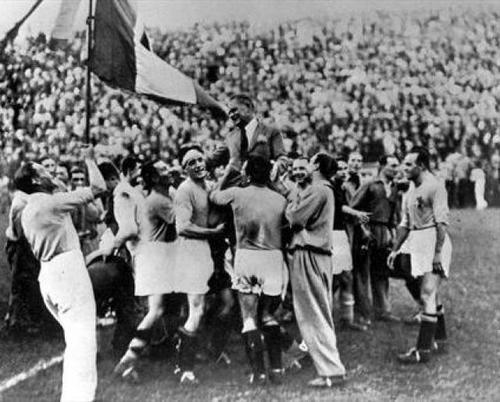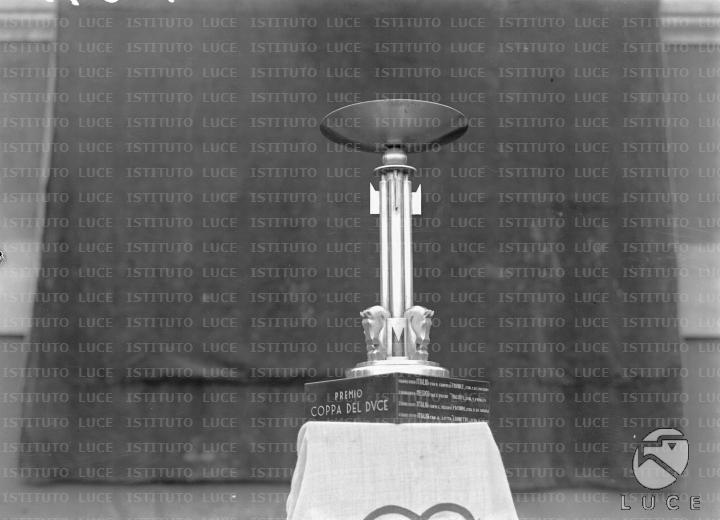Alex Constantine - October 20, 2013
October 11, 2013
As Italy gets ready to qualify for 2014 World Cup, TheHardTackle turns back time to the pre-war era of the game and discovers the introduction of politics in Calcio and how Italy won the title in 1934.
“The idea that politics and sport should be kept apart is laughable in Italy.”
Benito Mussolini, a direct result borne out of the frustration and anxiety of the Italians post the Great War was a revolutionary in terms of political ideologies. Not only did his fascist movement travel places, the very moot idea of using Football - one of the most popular pastimes of the common man back in the day as a propaganda in politics is what separated him and his German counterpart, Adolf Hitler from the rest of the pack. The journalist turned Prime-Minister established his fascist empire in the 20′s, and colonized the game in an attempt to shore up his agenda. In the words of Bill Murray,
“Mussolini’s Fascist regime was the first to use sports as an integral part of government.”
The second edition of the World Cup reached European shores and it was Italy who grabbed the privileges of being host to the footballing carnival. To substantiate his claim, Mussolini built several world class stadia within the country – Mussolini” stadium in Turin, the “Berta” in Florence, the “Edda Ciano Mussolini” in Livorno, the “XXVIII Ottobre” in L’Aquila, and the “Citta dello Sport” which opened in Rome in 1932 – all of them marvels of human art in the 30′s. The construction of these stadia was a symbol of the “willingness of the country’s rulers to position Italy as a pioneer in the European continent.”
John Foot, in his book “Calcio : A history of Italian Football” says -
“Mussolini was acutely aware of the powers of propaganda in shaping public opinion. He recognized that as the sport of the masses, he could use football to gain the support of a nation."
With Vitorio Pozzo at the helm, the Azzuri went into the tournament with the backing of an entire nation and most importantly, the hand of Mussolini. The team was not short on talent, especially in an attack led by the flamboyant Giuseppe Meazza, who grabbed headlines regularly domestically in Nerazzurri colours. But, they were not the only ones with a claim to lift the cup at the end of a grueling battle. Hungary, with their philosophy of free-flowing football, Spain, Argentina and defending champions Uruguay were among the prime contenders to make hay in Italy. But this is where Mussolini decided to step in. Uruguay decided to pull out of the competition in protest against Italy’s non-participation on the 1930 edition of the tournament, which was held in the South American country itself. Argentina were majorly depleted, courtesy of the oriundi, a policy that allowed players who were born outside the borders of the country to still play for the Azzurri.
Taking advantage of this, Pozzo called up the lynchpins of the Argentine team that played Uruguay in the finals of the 1930 World Cup – Raimundo Orsi, captain Luis Monti and Michele Andreolo. The trio added a further layer of quality to an already brimming Italian side, who then breezed past the qualifying rounds and the group stages, defeating Greece and United States in a goal-fest for the Azzurri faithful. The next stage is where things started getting ugly.
The quarter finals saw the La Furia Roja pitted against the Azzurri. Despite lacking household names like their counterparts, Spain were a well-oiled machine who were capable of upsetting big names on their day. The game, an overly physical battle ended in a crude draw. The replay, that would decide who would progress to the next round was the first instance of clear bias towards the Azzurri. The referee on the day, Rene Mercet was accused of blatant bias towards the Blues, understandable since he was a mere pawn in the hands of the grand old man – Benito Mussolini.
The Italian team lining up before a game.
Next up, Pozzo’s men came up against their old foes – Hugo Meisl’s Austria who were rightfully known as the ‘wunderteam’ of the 30′s. The Azzurri had already tasted defeat in the Central European International Cup (a fore-runner of the modern day Euros) just a couple of years back and would probably have to surrender once again, going by the form of the two teams; while Italy had reached this far due to the intervention of non-footballing forces, Austria had righteously staked their claim on the basis of some endearing attacking play, the latest victim of which were the Magyars.
On a heavily watered pitch at the home of Giuseppe Meazza, the evening brought two ends of the spectrum to a common meeting point – the football pitch. On one end, we had the negativity of Italy and on the other, the aesthetically pleasing football of Austria. However, as fate were to have it Italy finally ended their Austrian hoodoo and surprisingly, it was thanks to the machinations of their master – Mussolini. Enrique Guiata, one of the oriundi, scored the only goal of the match, the build-up of which had the Austrian Goalkeeper pushed quite blatantly. The game was more of a fist fight than a footballing delight and the more experienced team came out trumps.
On to the grand final of a not so grand event – Italy and Czechoslovakia faced off to decide the ultimate winner of the glistening trophy, the fate of which had already been written according to some quarters in the press. There were no customary pre-final ceremonies and it was all a very dull build-up to a not so dull occasion. The conspicuous absence of Mussolini on the eve of the game was put down to an alleged meeting between the dictator and the Swedish referee – Ivan Eklind. Legend has it that, the leader was so “pleased” with the referee’s performance in the semi-finals that he paid a personal visit and invited the Swede to officiate the finals. The rumours of Mussolini personally selecting match-officials were laid to rest as the unvarnished truth.
 Post Match scenes after the final
Post Match scenes after the final
The finale turned out to be as eventful – The Azzurri labored and with nearly 15 minutes to play, the Czechs took the lead courtesy Antonio Puc. A goal from Argentine import Raimundo Orsi leveled things up with just five minutes to go of regulation time. Angelo Schiavio put the hosts ahead in extra time and it turned out to be the clincher as Italy lifted the holy grail.
Mission successful for Mussolini. Through the success in the World Cup, he was able to unite the people of Italy in his movement to present Italy as a truly fascist empire.
Such was his dominance over proceedings that the dictator decided to have a second trophy made for the winners, called the “Coppa Del Duce” named after his honorific title – “Il Duce” (the Emperor.) It was an exquisite piece of art that stood at nearly six times the size of the original trophy. Studded with glitters and jewels all over its surface, the edifice stood as a symbol to the grandeur of the fascist empire of the country.
John Foot claims, “The victory in Rome, more than anything else, cemented the popularity of Mussolini.” The entire tournament was surrounded by the feel of warfare – Pozzo constantly used the analogy of his team of “soldiers” going into the “battlefield” to ultimately win the “War” of Football. Even the closing ceremony was a fascist dominated occasion, featuring fascist themes alongside Giovinezza’ – the fascist theme that proudly echoed around the walls of Stadio Nazionale, amidst the prominently fluttering Italian flag. It all came across as an event that was much, much more than the closing ceremony of a World Cup. It seemed to be the glorious parade of the acceptance of fascist principles by a nation. The meek acceptance of then FIFA President Jules Rimet all but confirmed that the 1934 FIFA World Cup was a misnomer – it was actually the 1934 Fascist World Cup. For those wondering if that team could ever win the World Cup without their godfather, look no further than the 1938 edition!









